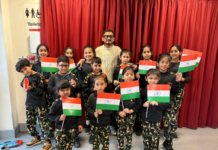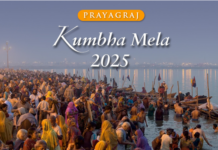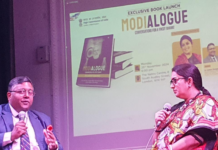Author Geetanjali Shree‘s International Booker Prize win has opened a window of opportunity for other deserving Hindi titles waiting for their share of readers and translations, Hindi writers said on Friday.
“Tomb of Sand“ – originally titled “Ret Ki Samadhi” – is the first Hindi work translated to English to have received the coveted recognition. The book was translated by author-translator Daisy Rockwell. The cash prize of 50,000 Pounds is split between the author and the translator equally.
The New Delhi-based author of three novels and several story collections, Shree has gotten her works translated into English, French, German, Serbian and Korean.
“Geetanjali Shree’s translation winning the Booker opens a new window of hope to Hindi writing. Due to lack of good translations and publishers interested in them, so many illustrious works of Hindi writers have failed to reach the canon of world-class literature. Celebrations are on at this benchmark for Hindi writers and readerSahitya Akademi Award winning Hindi novelist Alka Saraogi told PTI.
According to veteran Hindi writer Prayag Shukla, who claimed he was the first one to write a review of ‘Ret Ki Samadhi’, said it can’t get bigger and that Hindi literature is on its way to get its due status globally.
“It was bound to happen. The translation works of Hindi literature into various languages, including French and German, in the past few years have been really good. And it is the culmination of this that today Geetanjali, whom I have known since her teenage years as a very talented writer, has won the award.
“I am very happy and very hopeful of the future of Hindi literature. You will see translations of Hindi literature picking up pace 20 times more than ever,” the 82-year-old, author of several bestsellers, including “Bite Kitane Barasa” and “Ghara Aura Bahara”.
The 64-year-old Uttar Pradesh-born author winning the prize was that much more special for Rachna Yadav, managing director of Hans – the largest Hindi literary magazine in India — who said the author’s first work, a short story titled “Bel Patra”, was published in their magazine only in the late 1980s.
The magazine, which was founded by Munshi Premchand and had ceased publication in 1953, was re-launched by Rachna’s father, the late Hindi author Rajendra Yadav, in 1986.
“It is such a proud moment for us because we consider Shreeji a Hans writer. My father selected her works and published her three stories almost one after the other– which was really rare in Hans. I am certain that her success will give the desired push to Hindi literature and lead to more translations — and more importantly good quality translations,” said Yadav.
Set in northern India, the much-acclaimed book is a story about an 80-year-old woman who travels to Pakistan to confront the unresolved trauma of her teenage experiences of partition and re-evaluates what it means to be a mother, a daughter, a woman and a feminist.
Not only the veterans, but the 64-year-old author’s achievement has also brought a new sense of purpose and hope in the current generation of Hindi writers as well.
For instance, writer-filmmaker Era Tak, who did admit to once contemplating to start start writing in English, said Shree’s unprecedented achievement tells us that language is no barrier and “strong content along with proper platform” is all that you need to attain success.
“People would always say Hindi writing has no scope. And I, a Penguin author, would sometimes ask myself, ‘Shall I also write in English only?’ But this award gives us hope that if what you have written is good, it will be appreciated across the world,” the author of “Raat Paheli” and “Risk @Ishq” said.
“I hope the publishers will now be forthcoming in translating works of Hindi writers, at least in English. Because once done in English, it can be translated into other languages and the reach increases not only globally, but also in India,” Tak added.
That said, there is a word of caution from bestselling authorNaveen Chaudhary, who though immensely proud of the recognition coming the Hindi language way, said the immediate chances of other Hindi books feeding off from this rare achievement stands low.
Even the Oscar-winning movies don’t attain the global viewership immediately, things take time. So I don’t see any visible change in the Hindi literature market — not at least in the coming six months or a year, noted Choudhary, who previously also held the position of associate director of marketing atOxford University Press.
“Yes, there might be an increase in sales of this (Ret Ki Samadhi) book, but any other Hindi book is still going to sell on the basis of its content and the way it is marketed. But immediately, I am not sure how much boost it is going to give to Hindi literature,” the author of “Janta Store” and “Dhaai Chal” said.
Shree’s novel was chosen from a shortlist of six books, the others being: “Cursed Bunny” by Bora Chung, translated by Anton Hur from Korean; “A New Name: Septology VI-VII” by Jon Fosse, translated by Damion Searls from Norwegian; “Heaven” by Mieko Kawakami, translated by Samuel Bett and David Boyd from Japanese; “Elena Knows” by Claudia Pineiro, translated by Frances Riddle from Spanish; and “The Books of Jacob” by Olga Tokarczuk, translated by Jennifer Croft from Polish.(Press Trust of India)

Readers like you, make ESHADOOT work possible. We need your support to deliver quality and positive news about India and Indian diaspora - and to keep it open for everyone. Your support is essential to continue our efforts. Every contribution, however big or small, is so valuable for our future.











